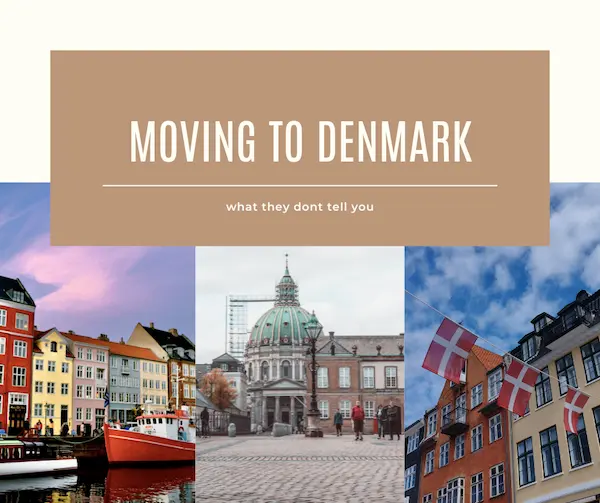If you’re dreaming of cozy cafés, bike-friendly streets, and a minimalist lifestyle, Denmark might be on your radar. After all, it consistently ranks as one of the happiest countries in the world. But moving to Denmark isn’t all hygge and pastries. There’s a lot that people don’t tell you — from navigating bureaucracy to bracing for the cultural cold (and not just the weather!).
This guide offers a deep dive into the things you really need to know before moving to Denmark, including the good, the frustrating, and the unexpected. Whether you’re relocating for work, love, adventure, or curiosity, read on for insider tips, practical steps, and a reality check from someone who’s been through it.
The Romanticized vs. The Real Denmark
From the outside, Denmark often looks like a modern utopia — clean cities, progressive values, free healthcare, and beautiful design. And yes, much of that is true. But moving there comes with its own set of hurdles:
- Housing shortages in popular cities like Copenhagen and Aarhus
- Language barriers, especially with government paperwork
- A high cost of living that surprises many expats
- And a culture that can seem a bit cold and reserved at first
👉 Read more about Summer In Copenhagen here
Step-by-Step Guide: Getting Settled in Denmark
1. CPR Registration (Your Golden Ticket)
The CPR number is your lifeline in Denmark. Without it, you can’t access healthcare, open a bank account, or even get a library card.
Steps to get your CPR number:
- Secure housing (you need a formal rental contract)
- Book an appointment at the International Citizen Service (ICS)
- Bring your passport, rental contract, and proof of residence
- Wait 1–2 weeks for your yellow health card (Sundhedskort)
Helpful resource: LifeinDenmark.dk CPR guide
2. Opening a Bank Account
Danish banks are notoriously selective. You’ll need:
- CPR number
- Passport or EU ID
- Proof of address
- Employment contract or enrollment if you’re a student
Tip: Try Danske Bank, Nordea, or Lunar (digital bank).
3. Accessing Healthcare
Once you get your CPR number, you’re automatically assigned a general practitioner (GP). All healthcare visits are free at the point of service, though dental and vision care may cost extra.
🔗 More on how healthcare works in Denmark: Life in Denmark healthcare guide
Working in Denmark: Contracts, Work Culture & Unions
The Danish work environment is famously flat and egalitarian — but also a bit of a culture shock for newcomers.
- Contracts are essential. Most include a probation period, and you’ll want to check notice periods and pension clauses.
- The work culture is punctual and informal. People call their boss by their first name — but don’t mistake that for a lack of professionalism.
- Unions play a big role. Many workers are unionized and enjoy strong protections, even in the private sector.
- Work-life balance is sacred. You won’t get bonus points for staying late.
If you’re freelancing or self-employed, Denmark can be tricky. There’s lots of paperwork and high tax — but the infrastructure is great once you’re set up.
Raising Kids in Denmark: What to Expect
If you’re bringing little ones with you, Denmark is an excellent choice — but it’s not without surprises.
Pros:
- Public daycare (vuggestue and børnehave) is high quality and heavily subsidized
- Parental leave policies are generous
- Schools encourage independence and outdoor learning
Challenges:
- Daycares are mostly in Danish — immersion works, but it’s an adjustment
- Waiting lists can be long in big cities
- The approach to discipline and risk-taking may differ from what you’re used to
Still, Denmark is one of the best places in the world to raise kids — it just takes some getting used to.
How to Handle Culture Shock in Denmark
Danes are kind and respectful — but don’t expect immediate friendships. Relationships take time.
Common culture shock experiences:
- Reserved behavior: Small talk is rare. People value privacy.
- Blunt communication: Directness is appreciated. Don’t take it personally.
- The Law of Jante: A cultural norm that discourages bragging or standing out.
How to adjust:
- Join local clubs, volunteer, or take Danish classes (even if everyone speaks English)
- Accept that things move slower when it comes to social integration
- Learn to love the quiet moments — it’s a big part of hygge culture
Denmark vs. Other Nordic Countries: How It Stacks Up
| Feature | Denmark | Sweden | Norway | Finland | Iceland |
|---|---|---|---|---|---|
| Language | Danish (tricky!) | Swedish | Norwegian | Finnish (very different) | Icelandic |
| Cost of Living | High | High | High | Moderate | Very High |
| Work-Life Balance | Excellent | Good | Excellent | Excellent | Good |
| Integration Support | Strong | Moderate | Moderate | Strong | Limited |
| Weather | Mildest winters | Colder | Snowier | Coldest | Volcanic & wild |
Conclusion: Denmark offers a sweet spot for expats — a balance of opportunity, safety, and structure. But don’t underestimate the cultural transition. Sweden and Norway might feel easier for English speakers, while Finland and Iceland are more niche moves.
The Bottom Line: Should You Move to Denmark?
Denmark is a fantastic place to live if you’re well-prepared. The quality of life is high, the systems work, and once you’re in — you’re in. But don’t expect instant integration or a free ride.
Key Takeaways:
- The bureaucracy is real, but manageable
- It takes time to build a social circle
- Cost of living is high — but so is the quality of life
- It’s not a “move tomorrow” type of place — planning is key
Internal Resources from PeakstoShore
- 👉 Best Danish Cuisine: Must-Try Dishes in Copenhagen
- 👉 Best Copenhagen Street Food: Reffen Market Guide
- 👉 Best Copenhagen Co-Working Spaces for Digital Nomads
FAQs: Moving to Denmark
Is it hard to move to Denmark?
It can be — especially if you’re coming from outside the EU. Expect paperwork and waiting periods. But with a job offer or through family reunification, it’s definitely doable.
Do I need to speak Danish?
Not at first — many Danes speak fluent English. But for integration, job opportunities, and bureaucracy, it helps a lot.
Is Denmark good for families?
Absolutely. It’s one of the most family-friendly countries in the world.
Can I afford it?
You’ll need to budget carefully. Rent, groceries, and dining out are expensive. But public services and quality of life make up for it.
If you’re up for the challenge, Denmark can absolutely be worth it. But go in with your eyes open — and your paperwork ready. The payoff is a peaceful, safe, and beautifully designed life that values balance over burnout.
See you in the bike lane 🇩🇰
👉 Over to you!
Have you moved to Denmark or are planning to?
What’s the one thing you wish you knew before making the leap?
👇 Drop your thoughts in the comments or connect with us on Instagram — we’d love to hear your story.






0 Comments